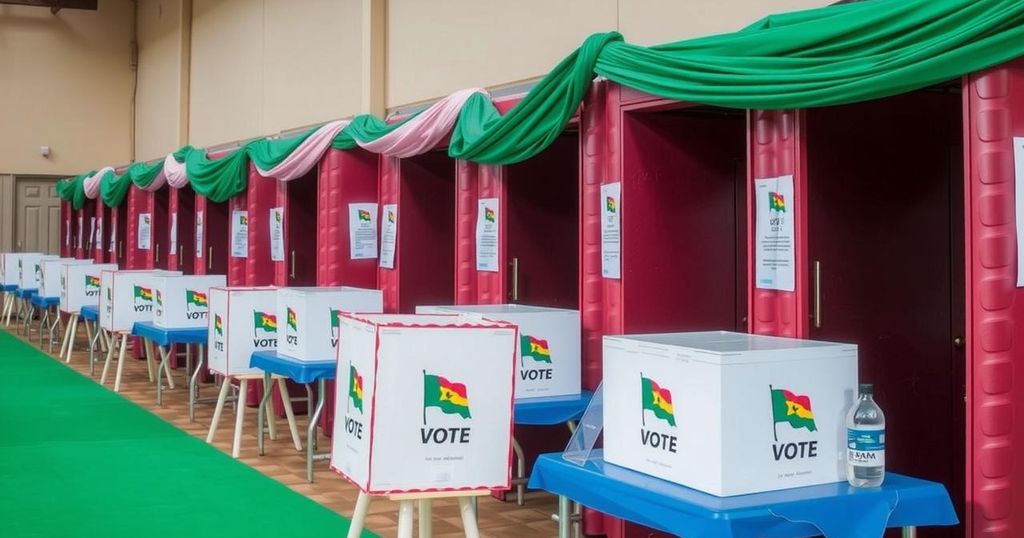Ghana’s Elections: A Test of Democracy Amid Economic Crisis

Ghana’s presidential and legislative elections commenced on Saturday amid a major economic crisis. With nearly 18.7 million registered voters, the election is viewed as a significant test for democracy. The main candidates, Mahamudu Bawumia of the NPP and John Dramani Mahama of the NDC, face criticism for their indistinguishable economic strategies as the country grapples with soaring inflation and unemployment.
On Saturday, polls were opened in Ghana, where citizens were set to participate in a pivotal presidential and legislative election. With approximately 18.7 million voters registered, the elections are viewed as critical for the country, long considered a democratic model in West Africa. However, the elections occur against the backdrop of a severe economic crisis, characterized by rampant inflation and a high unemployment rate, affecting public sentiment regarding the future of their nation.
Once a model of political stability, Ghana has faced economic turmoil in recent years, with inflation reportedly reaching 54% by the end of the previous year. Both major presidential candidates, Mahamudu Bawumia of the ruling New Patriotic Party and former President John Dramani Mahama of the National Democratic Congress, face skepticism from voters who see little difference in their economic proposals. Despite running in an election with twelve candidates, the contest has boiled down to a choice between these two politicians.
The new parliamentary elections involve 276 seats, while the current legislative powers are evenly split between the ruling NPP and the main opposing party, the NDC. Both candidates made final campaign appeals in which Bawumia emphasized continuity and stability, while Mahama called for a comprehensive “reset” of the country’s systems. The ambiance throughout Accra highlights voter engagement, even as economic concerns remain paramount, particularly regarding issues such as illegal gold mining and the rising cost of living.
The election occurs in a context where the nation’s economic stability has sharply declined, manifesting in default on foreign debts and rising prices for basic necessities. Illegal mining activities, driven by economic desperation, exacerbate environmental issues, creating additional challenges for the government. As Ghanaians head to the polls, the focus may well rest on candidates’ abilities to address these pressing economic realities, marking a critical moment in the nation’s democratic journey.
The general election in Ghana is pivotal as it unfolds during a significant economic crisis, marking a departure from the country’s previous position as a beacon of democracy in West Africa. Historically, Ghana has been known for its political stability and progressive economic growth. However, the current economic scenario, characterized by high inflation rates, widespread discontent, and unemployment, threatens this legacy. The elections serve not only to elect a president but also to gauge the candidates’ proposed responses to profound economic challenges facing the nation.
In conclusion, the Ghanaian elections represent more than a contest between political parties; they signify a crucial juncture for the nation amidst severe economic hardship. With a leadership choice between candidates who have yet to inspire confidence in substantive change, voters face a daunting path forward. This election could either reestablish Ghana’s reputation as a democratic stronghold or signal further decline if leaders fail to address the urgent economic issues plaguing the country.
Original Source: www.newsday.com







